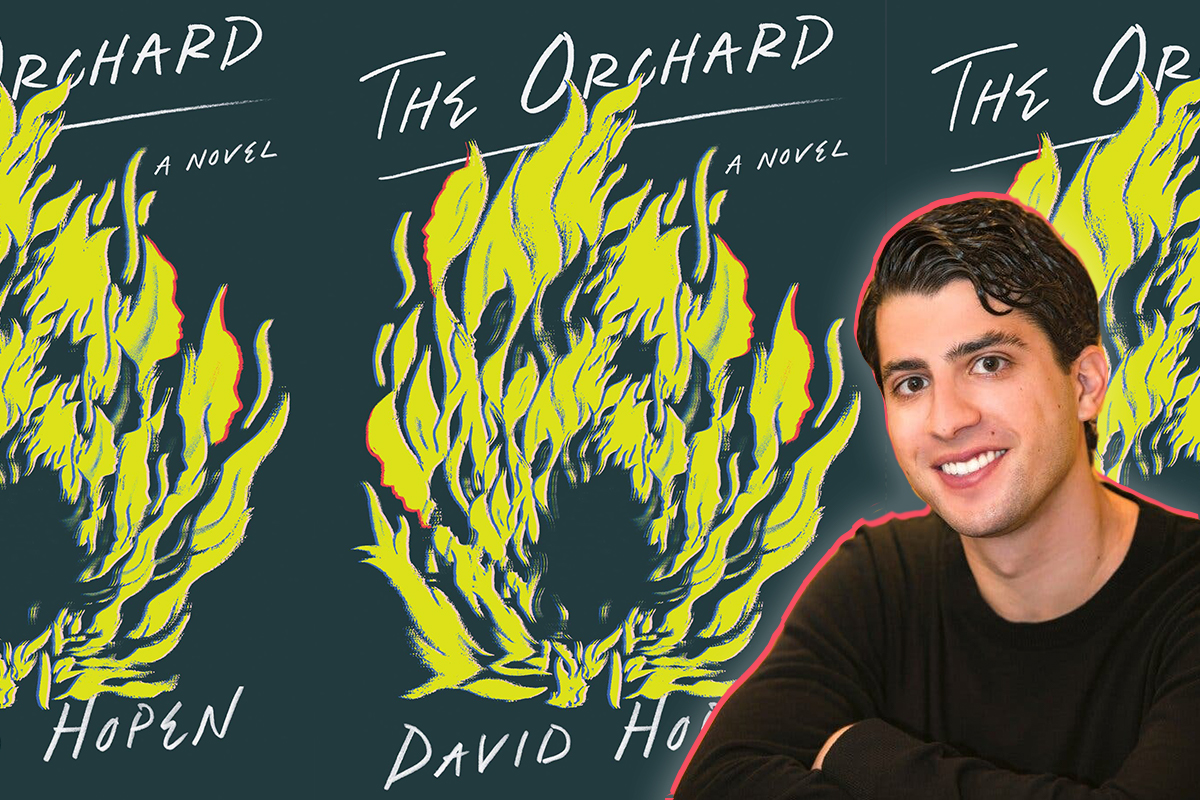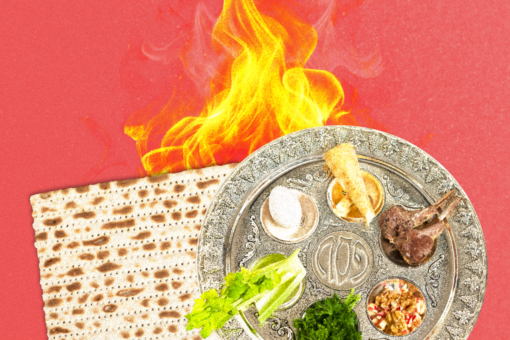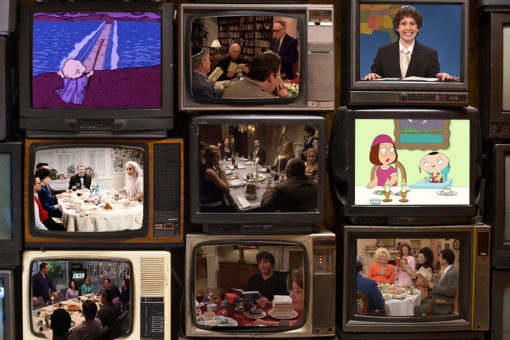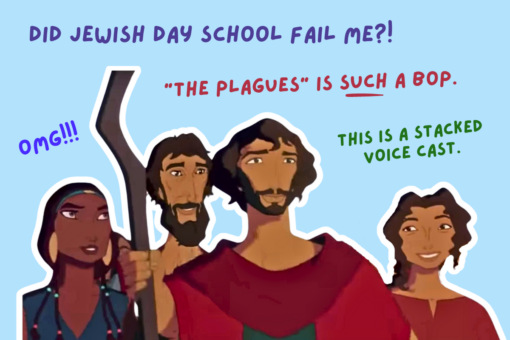David Hopen has been busy. As a first-year law student, he’s facing an onslaught of coursework and exams, and like all of us, he’s dealing with the endless effects of the endless pandemic. It makes for a particularly chaotic time to release a debut novel into the world, but release it he did, and to critical acclaim.
The Orchard, published in November 2020 by Ecco Press, tells the coming-of-age tale of Ari Eden, a Jewish kid from the frum world of Brooklyn who gets what any misfit teenager dreams of: a chance to reinvent himself. When his family moves into the smallest house in the glitzy fictional Miami suburb of Zion Hills, Ari attends a prestigious Modern Orthodox school filled with brilliant, troubled, experienced (and often beautiful) kids and a probing rabbi who assigns philosophy books for fun. In a version of Jewish life — and life in general — that looks nothing like it did back in Brooklyn, Ari must decide which parts of his past self he can shed and which parts he’s stuck with, for better or worse.
Oh, and there’s also a whole plot point based off the Talmudic myth of “Pardes,” Hebrew for orchard, with hallucinogenic drugs, sex, and violence woven throughout. It’s a wild, ambitious book, both in length and depth, made all the more impressive when you learn that Hopen was in high school when he started writing it. It’s also an incredibly Jewish book, both for the obvious reasons of its setting and characters, and for its bold attempt to answer life’s biggest questions — intellectualizing, analyzing, and moralizing along the way.
After first virtually chatting with him at the Miami Book Fair last fall, I was thrilled to talk more with Hopen about The Orchard and how his own upbringing in the Modern Orthodox world, along with his interest in law, inform the world of his fiction.
One of my favorite aspects of this book is just how deep you dive into a very particular world that doesn’t often get the mainstream treatment. I personally have never read a novel set in a Modern Orthodox community, and I’m wondering, does the world of Zion Hills at all resemble the MO community you grew up in?
Zion Hills bears no resemblance to the community in which I grew up. It’s very much a fictionalized city — aesthetically, financially, geographically. In forming this world, however, I wanted to draw from elements critical to my own childhood and to the warm, wonderful community where I was raised.
Having attended yeshiva day schools, I was interested in replicating the feel of a dual-curriculum education, in which long days split between Judaic and rigorous secular studies. Flitting seamlessly from morning prayers to AP classes involves a beautiful synergy. I wanted to encapsulate that complex, fascinating balance, the way a structure centered on meaningful ritual need not preclude participation in society. I also aimed to provide a sense of the profound, life-long friendships formed at this age and in such communities. And finally, I viewed South Florida as a perfect backdrop for this story, both atmospherically and in terms of envisioning a modern Eden — at least for someone fleeing an old life and seeking dazzling sunlight, beauty, freedom.
Let’s talk about names. Your main character, Ari Eden, gets called at least six different names in the book: Aryeh, Ari, Drew, Andrew, Eden, and Hamlet. How did you decide when to use each name and what was the significance of switching between them?
Oftentimes, the decision was natural. I lived with these characters for long enough to extract an accurate sense of their personalities and interactions. Certain contexts called for affectionate nicknames, other times for distance. More broadly, though, names function as devices by which to track progression. Ari explores the moral weight of bearing a Hebrew name, and the way religious identity interacts with a fundamentally contemporary environment. This is a novel involving internal evolution as well as the art of projection, and so what characters might be called in given moments coheres with the ways we actively reform ourselves, with the way we reckon constantly with the link tethering who we hope to become and where we currently stand. One Midrashic commentary on Genesis features God asking Adam to select his own name. That sense of liberty — and power — animates Ari’s ability to peer both inward and outward so as to fashion for himself a name.
The title of the book, the central theme, and ultimately a huge part of the plot are based on the Talmudic story of Pardes, or the orchard. It’s a simple story I’ve read before, though I never really felt like I could quite understand it. When did you first learn the story of Pardes, and what drew you to center your novel around it?
I’ve always been drawn to this myth, which I first encountered in yeshiva. In my view, the story gives insight into how we view the human capacity for holiness while also raising questions useful for forming religious, and civic, identities. Whatever occurs within the orchard — both in the Talmud and in my novel — demands that we consider the relationship between what is good and what is moral. And it also asks that we ascertain what it means to lead worthy lives, and what ultimately becomes of our natural longing for transcendence. These are questions I was eager to explore through fiction, and I think these are questions faced by anyone interested in finding meaning in an increasingly changing world, particularly given how COVID has reshaped the structure of daily American life.
There’s a lot of conversation around an author’s responsibility, especially one coming from a minority community, to translate — or not translate — certain words, phrases, and terminology that readers might not be familiar with in their writing. This book is rife with Hebrew and Jewish terminology — did you ever question whether you’d need to define anything? And why did you ultimately decide to leave them as is?
The question was short-lived. Hebrew expressions are present on occasion, but very much contextual. The goal was to build an authentic, immersive environment, and sometimes glossaries prove distracting. One of the great joys in reading about different cultures, in my own experience, is discovering the beautiful details of new worlds, and so I wanted to be careful about shattering the fourth wall or lessening the experience of plunging into a story. And if philosophical discussions about the works of Sigdwick, for example, don’t receive such treatment in the novel, why should assorted cultural phrases be treated with heightened caution? My hope is that this makes for a reading that is perhaps slightly deeper and more absorbing.
The book is filled with references and quotes from Jewish thinking, philosophers, classic literature, etc. Were there any guiding texts you turned to again and again while writing the book?
Writing this novel as an undergraduate — and revising while earning my master’s — led to a natural synthesis between my fiction and academic work. My research centered on studies in literature and in moral and legal theory, and so thinkers whose work I consumed featured in this story, both conspicuously and indirectly. Poets like Shelley and Wordsworth and Yeats played important roles while developing the manuscript, as did works ranging from Shakespeare to Fitzgerald to Ronald Dworkin to the Talmud. Ari’s hunger — for learning, for experience — initially finds fulfillment through independent reading, and I wanted that literary feeling of grandeur and exploration to permeate The Orchard and define its characters.
One theme throughout the book is this idea of whether one must suffer to ultimately experience joy. I’m wondering how much of working on this book over the years felt like suffering, and how much like joy?
Writing necessitates labor. Whether producing a novel in this fashion — embarking on the story as a high school senior, completing a draft during free moments as a college student — makes for an easier or more difficult reading experience remains uncertain. But I do know that this book was a joy to write. I loved living with this book over the course of many — and pivotal — years, I loved watching as it evolved from a passion project to a serious prospect to a fully developed work alive in the world. The ideas and characters have served as my constant companions since I was 18, traveling with me to new schools and new countries, a coming-of-age tale that came of age with me.
Have you noticed any stark contrasts between the feedback you get on the book from Jewish readers vs. non-Jewish readers?
In truth: no, I haven’t. Perhaps because the novel contains so much, each reader undergoes an individualized experience entering The Orchard. I think, in some circles, there is an expectation that Jewish readers, familiar with particular practices of Modern Orthodox life, more easily extract certain nuances from the story. And yet, overwhelmingly, I’m told this is absolutely not the case, and so I admit that I’ve really enjoyed feedback that pushes back on such assumptions. The story might unfold in a religiously insular backdrop, but its themes are universal.
So you’re now in your first year of law school. Do you see any crossover between your passion for writing and your interest in law?
Considerable overlap exists. Law impacts how I approach fiction, magnifying the moral impact of language, the way words find life beyond the page. At the same time, my writing career allows me to approach law in a humanistic fashion, to envision the real-world effect theory has on human lives. Each side enriches the other, and pursuing these two spheres in unison has been a wonderful privilege.



